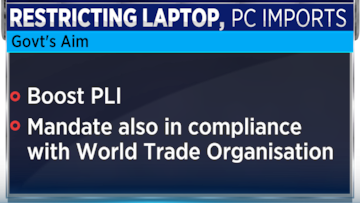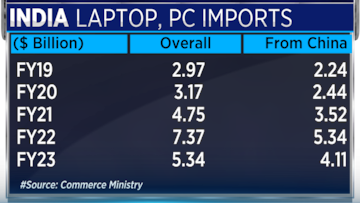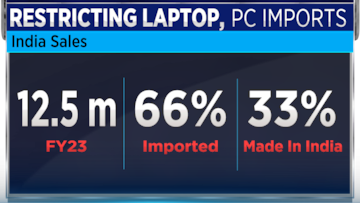India's recent directive mandates that importers of laptops and PCs obtain a license. The country imported $5.3 billion worth of laptops and PCs in the previous fiscal year (FY23), which translates to around eight million units, with over 90 percent of these imports originating from China.
The government aims to encourage domestic production of these devices. However, concerns arise within user industries such as IT companies and global captive centers (GCCs) regarding potential supply shortages and the assurance of desired quality standards for laptops and PCs. The local industry is optimistic about scaling up, aided by production-linked incentive (PLI) schemes, in collaboration with multinational laptop manufacturers.
To gain insights into different perspectives, CNBC-TV18's Latha Venkatesh conducted exclusive interviews with Megha Chawla, Partner & Capability Sourcing Leader at Bain & Co; Tarun Pathak, Research Director at Counterpoint; Ashish Agarwal, VP & Head-Public Policy at NASSCOM and Saurabh Gupta CFO Dixon Technologies.
Information from government insiders also suggested that the intent behind this decision is to foster the ‘Make In India’ initiative, enticing both investments and corporations to establish
domestic manufacturing within India. These sources further indicated that the government aims to emulate the successful iPhone model, leveraging India's proficiency in the assembly aspect of the value chain for laptops and PCs. This strategic move seeks to gain a competitive edge in this sector.

Agarwal expressed his concern emphasising that this is an issue worth being mindful of. According to him, the previous concept of import licenses pertained mainly to restricted goods and encompassed all items. Therefore, a comprehensive revision of the
import process is required. Considering the substantial scale at play, any rejection of applications or procedural delays could hold notable consequences. As a result, we are in active conversations with the government, meticulously assessing the situation, he stated.
Meanwhile, Chawla said, “Over the next two to three months things are going to unfold and we would expect that the modalities here are keeping in mind the sheer
impact on business, on the consumer, and hence are easing the pain while taking into account all other considerations that have been behind this ruling.”
According to Gupta, the commencement of significant earnings from exclusive Indian manufacturing is expected to commence in the upcoming fiscal year. During the current year, even after November 1, the government will issue licenses to brand owners, allowing them to continue imports and prevent any shortages.
For the entire discussion, watch the accompanying video
First Published: Aug 24, 2023 2:56 PM IST






